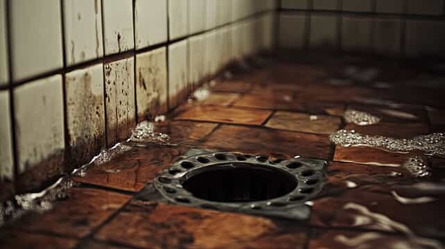Sewage backups create difficult circumstances for property owners. If sewage water backs up and overflows into a residence, it can completely disrupt the life of a homeowner. Sewage backups lead to health risks, expensive repairs, and even a temporary relocation for residents during the remediation process. Because of this, it is important to know how to prevent sewage backups from occurring in your home.
How to Prevent Sewage Backups in Your House
Avoid flushing improper items. Foreign objects and improper items can clog pipes and lead to backups. Avoid flushing paper towels, baby wipes, and grease. Maintain your sewer line by investing in professional inspections. Periodic inspections of your plumbing system can help you identify problems that could lead to flooding and sewage backups. A professional water damage remediation company can help homeowners detect issues such as clogs or leaks before the damage gets worse.
Check for tree root intrusion. Tree roots can grow towards sewer pipes and cause blockages by entering your plumbing system through cracks or weak points. Tree root intrusion can rapidly increase once it begins, and in most cases, this type of plumbing blockage will require professional attention.
Install backflow prevention valves to prevent sewage backups. A backwater valve is a device that prevents sewage from flowing back into a home. The valve uses a flap that closes after water exits the home, preventing sewage from backing up into the home. Backwater valves can protect homeowners from sewage backups during heavy rainfall or precipitation.
Signs That Your Home Is at Risk for Sewage Backups
Slow-draining water can be an early sign that your pipes are partially clogged and may be at risk of causing a sewage backup in your home. Foul odors emanating from drains or toilers could also signal a sewage problem that can lead to severe consequences if left untreated. Check for gurgling noises from plumbing fixtures to detect early signs of sewer line problems.
If multiple drains in your house are clogged simultaneously, the problem may be related to a sewer line issue rather than isolated plumbing problems. Simultaneous drain clogs could be a sign that your residence is at risk for sewage backups and serious plumbing failures. Shared drain or sewer line blockages can stop wastewater from leaving your home and cause a sewage backup.
Regular Sewer Line Maintenance for Homeowners in Alexandria, VA
Homeowners in Alexandria, VA, should invest in regular inspections from sewage system experts. Professional inspections can help identify plumbing problems and prevent sewage backups. Many homes in Alexandria have older plumbing systems, which can be more prone to issues like blockages and leaks. Annual inspections ensure your home’s plumbing is fully functional.
Routine sewer line cleanings can remove debris, grease, and other materials that can accumulate and cause blockages. Sewer line cleaning is an essential service for homes in older neighborhoods where the pipes may have deteriorated over time. Professional septic system cleaning services help homeowners maintain their sewer lines and prevent sewage backups from occurring.
How Storms and Heavy Rain Can Increase the Risk of Sewage Backups
Extreme weather conditions can increase the risk of sewage backups in your home. Heavy rain and storms in Alexandria, VA, can overwhelm the local sewage system and increase the risk of backups in residential areas. Excessive rain can cause tree roots to grow rapidly and create blockages within your sewer lines. Heavy rainfall can also oversaturate the soil around septic systems and make it difficult for sewer systems to function properly.
Invest in preventive measures to decrease the chances of a sewage backup occurring in your home. Maintain your plumbing by cleaning your gutters and downspouts to prevent water from flooding your property. Installing a sump pump can prevent flooding in basements and crawl spaces and reduce the likelihood of water damage occurring in your home after a storm.
Common Causes of Sewage Backups in Alexandria, VA Homes
Aging plumbing systems can cause problems that lead to extreme plumbing failures. Outdated plumbing systems are susceptible to issues such as leaks, cracks, and root intrusion. Corroded or cracked pipes are vulnerable to tree root intrusion and may exacerbate plumbing problems.
Improper waste disposal is another common cause of sewage backup. Flushing non-biodegradable items like paper towels, baby wipes, and cooking grease can clog your sewer system and prevent sewage from exiting your pipes. Clogs can also be caused by large amounts of food waste or hair buildup in drains.
Debris accumulation can lead to plumbing clogs. Over time, debris from soap, hair, and even toilet paper can cause blockages that lead to sewage backup. Regularly cleaning, maintaining, and inspecting your sewer lines can prevent clogs and detect potential blockages before they cause sewage overflow.
ServiceMaster National Capital Restoration: Your Partner in Sewage Backup Prevention and Cleanup
ServiceMaster National Capital Restoration offers professional sewage cleanup and restoration services in Alexandria, VA. Our sewage cleanup services provide customers with a safe, effective restoration that returns your home to its pre-damage condition. Our comprehensive services. We also offer preventative maintenance services to reduce the risk of sewage backups.
Homeowners can count on our 24/7 emergency services to help remediate their water damage at any time. Quick response to sewage backups can minimize damage and health risks to homeowners. Our emergency response team is committed to providing homeowners with timely service and efficient restoration that is there for you when you need it the most.
Sewage backups can create stress among homeowners. Our water damage restoration specialists provide customers with insurance claim assistance. By documenting evidence of your water damage and communicating with your insurance company, we help you navigate the insurance claim process so you can focus on getting your home back to normal after this catastrophic event. Call us today at 703-991-4845 to schedule a consultation with a member of our team.


